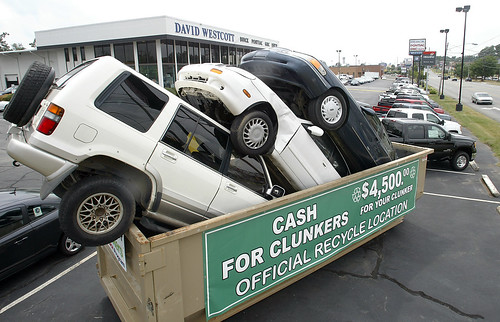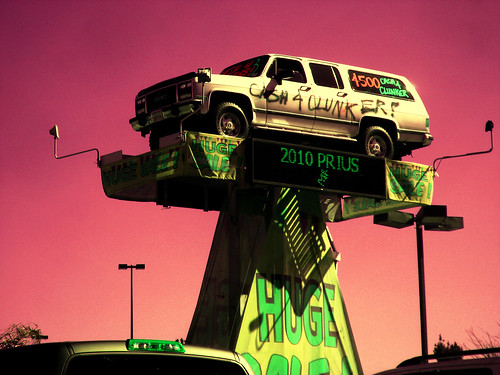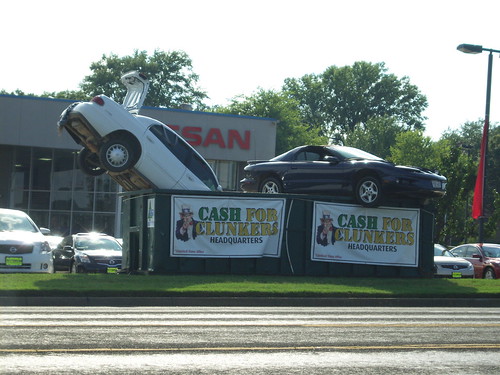Cash for Clunkers Update – August 25,2009: Indefinite Filing Deadline Extension for Dealers; Sen. Bill Frist Cashes In His Clunker for Prius; Dealers Polled Say Program is a Nightmare; Top Fuel-Efficient Cars
(Source: Autoblog; Detroit Free Press; US Infrastructure; Autoblog Green)
Cash for Clunkers over, dealer deadline for filing extended indefinitely
The website has been down since yesterday morning, and the Transportation Department has officially extended the deadline for dealers to file their reimbursement requests twice now – once yesterday to noon today and again late last night. The second extension is open ended until the site comes back online and is able to handle the influx of dealer submissions.
The government website went down at some point before noon on Monday morning, presumably when dealers nationwide began submitting their final reimbursement requests from last weekend’s bonanza sell-a-thon. All the government is saying right now is that dealers will have any time lost while the site was down to submit their final paperwork.
The U.S. Department of Transportation said as of this morning 665,000 deals had been entered, for claims totaling $2.77 billion. That would mean about $130 million remains of the $3 billion set aside for the program, after $100 million the government expects to spend overseeing the program.
After thousands of dealers complained of being unable to enter deals before Monday’s 8 p.m. deadline, federal officials said the system would not be fully functional until today, and that dealers would be given additional time to submit papers. Click here to read the entire article.
Most fuel efficient cars available in the ‘Cash for Clunkers’ scheme (Not sure how useful this is anymore for buyers since c4c expired)
However, if you’re more environmentally conscious, you may want to know which are the most fuel-efficient cars available under the program. To qualify as ‘eco-friendly’, new vehicles must get at least a EPA rating of 22 MPG combined to be eligible. Now that’s pretty bad, but it’s not like there’s a ton of car choices that get great MPG (at least in America). Click here to read the entire article.
Dealer poll calls Cash for Clunkers a ‘Nightmare,’ four out of 10 didn’t want program extended
A recent (admittedly unscientific) survey conducted by Automotive News shows that 44% of the 800 dealers polled wouldn’t want C4C to be extended again, even if the program was modified. Only 3% felt that the program should have been extended without being modified. The biggest issue dealers have with C4C is, unsurprisingly, its lack of timely payment. Some multi-store dealers have millions invested in the program, while little or no money has come in yet. An alarming 23% of dealers say they have had to borrow money to cover the cash crunch left in the wake of the Clunkers program, while an additional 10% say the program has actually sucked enough cash from the coffers that it has put the dealership at risk. Click here to read the entire article.
Sen. Bill Frist uses Cash for Clunkers, junks Suburban for Prius
Apparently, it’s a common misconception that all Prius drivers are Democrats. Not true. In fact, recently retired Senator Bill Frist (R-Tenn.) just got himself a shiny new hybrid hatchback from Toyota. The former senator even got a few thousand dollars off the price of his new eco-friendly ride courtesy of the just-concluded Cash for Clunkers program here in the United States. In an interview on Larry King Live, Frist responded to King’s quip that “You don’t see a lot of Republicans driving a Prius” with the response that the hybrid’s 50 miles per gallon along with the fact that “the taxpayer gave me $6,000 to do it” as reasons for the Prius purchase. Click here to read the entire article.






